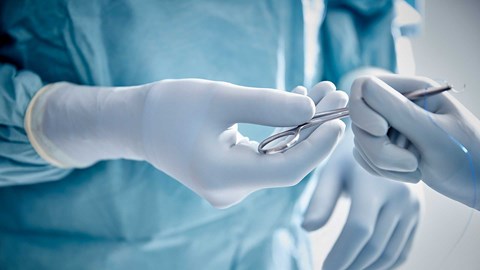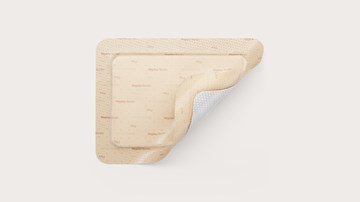More than 9 in 10 UK surgeons encounter a needlestick injury
- 93% of practicing UK surgeons agreed that high quality gloves reduce exposure to blood-borne viruses;
- 73% said that glove failure increases the risk of surgical site infections;
- 90% agreed that high quality gloves improve patient safety;
- The survey of practicing surgeons was undertaken across six countries, including the UK; a global first of its kind, it builds on Mölnlycke UK’s landmark 2018 poll of Royal College of Surgeons members’ attitudes to high quality surgical gloves
94% of practicing UK surgeons have either been personally affected by a needlestick injury or have seen a colleague experience one, increasing their risk of infection, a new survey has found. Just 2% of surgeons said that they had never experienced a needlestick injury in the operating theatre.
The findings come from a first of its kind survey of 510 surgeons from across the UK, US, Germany, Australia, Japan and Sweden conducted by SERMO for Mölnlycke, a world-leading medical solutions company. SERMO is the leading global social network for doctors, with 800,000 members from 96 specialties.
The survey looked at key opinions from surgeons relating to infection prevention and the role of high quality gloves in improving patient and clinician safety. It provided a clear demonstration of the importance that surgeons place on the provision of high quality gloves in reducing exposure to blood-borne viruses and improving patient outcomes
Clinician safety
Needlestick (or sharps) injuries occur when a needle or other sharp instrument accidentally penetrates the skin. One hundred thousand needlestick injuries occur across the NHS each year
The SERMO survey found that 93% of UK surgeons think that high quality gloves reduce the chance of exposure to blood-borne viruses 82% found that using high quality gloves affected their sense of being protected in the operating theatre. 92% agreed that clinician safety in the operating theatre was improved though the use of high quality gloves.
Patient safety
With regard to patient safety, the survey highlighted the vital role of surgical gloves in ensuring patient safety. 90% of UK surgeons agreed that high quality surgical gloves improved patient safety in the operating theatre. 89% agreed that high quality gloves can have a positive impact on surgical outcomes.
Tim White, a Consultant Colorectal Surgeon at the Chesterfield Royal Hospital said:
“There should be no argument or substitute for having high quality surgical gloves which give the upmost protection to the surgeon, the patient, the OR team, which fit comfortably, with maximal tactile sensitivity and durability.”
Commenting on the survey findings, John Timmons, Clinical Staff Nurse and International Medical Director, said:
“This ground-breaking survey highlights the value that surgeons across the globe place on high quality equipment. Surgeons clearly recognise that investing in high quality gloves can play a vital role in both ensuring the safety of surgeons and improving outcomes for patients.
“Surgical gloves are one of the key factors that prevent infections in the operating room and should not be viewed as a commodity. High quality means fewer glove failures, yet we are increasingly seeing healthcare systems around the world prioritise price over quality.
“Each year, millions of surgeons and their teams risk exposure to life threatening blood-borne viruses and it is essential that we recognise the critical role of high quality gloves in offering the first line of protection.”
An estimated 300,000 health care-associated infections take place every year across the NHS, costing an estimated £1 billion annually. The prevalence of healthcare-associated infections in hospitals in England in 2011 was 6.4%, with NICE stating that ‘Each one of these infections means additional use of NHS resources, greater patient discomfort and a decrease in patient safety’
When asked about glove failure during an operation the vast majority of UK surgeons (77%) responded that it increases the risk of surgical site infections.
NOTES TO EDITORS
Media enquiries
Please contact:
Will Culliford or Michael Latham, Lexington Communications
E: Molnlycke@lexcomm.co.uk
T: +44 20 7025 2300
OR
Liz Neal, Mölnlycke
E: liz.neal@molnlycke.com
T: 07787 432 560
About Mölnlycke
Mölnlycke is a world leading medical solutions company. Our purpose is to advance performance in healthcare across the world. That is why we aspire to equip everybody in healthcare with solutions to achieve the best outcomes. We develop and bring to market innovative wound care and surgical solutions along the entire continuum of care – from prevention to post-acute settings. Our solutions provide value for money, supported by clinical and health economic evidence.
Mölnlycke was founded in 1849. Nowadays, our solutions are available in around 100 countries; we are the number one global provider of advanced wound care and single-use surgical products; and we are Europe’s largest provider of customized trays. Our headquarters are in Gothenburg, Sweden and we have about 7,800 employees around the world. Learn more at molnlycke.com.
About SERMO
SERMO is the most trusted and preferred social network for doctors. It’s private and exclusively for doctors. SERMO is the meeting of medical minds and hearts. It’s a virtual doctors' lounge.
All of SERMO's over 800,000 members are verified and credentialized physicians. SERMO has also opened its doors to the global community, including physicians from 150 countries with plans for a continued global expansion. Find out more at www.sermo.com.

A survey has found that needlestick injuries are far more common than previously thought. In April 2019, Mölnlycke® commissioned a first of its kind survey from SERMO, the largest global social network for physicians.
'References'



